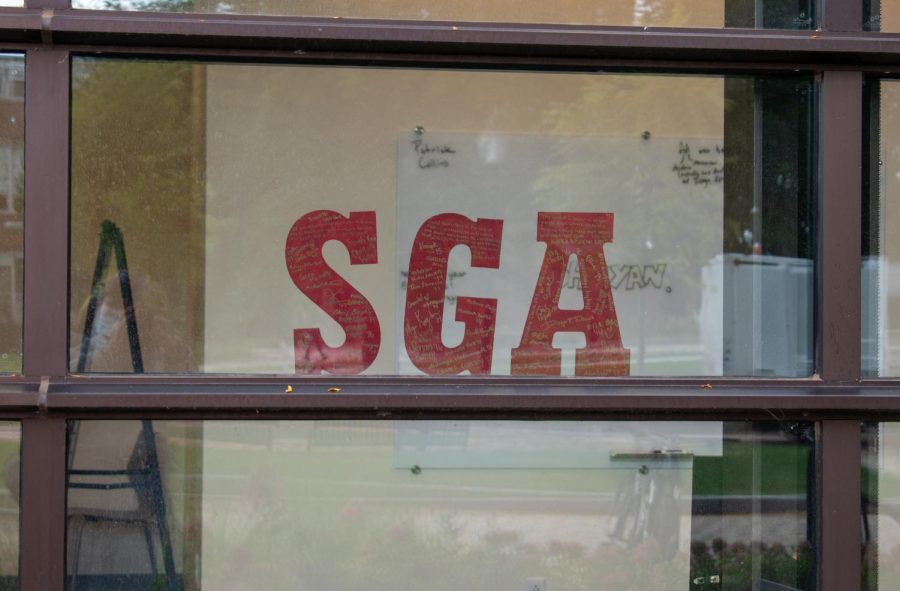When the University of Massachusetts Student Government Association began its legislative session in September, neither Patrick Collins nor Bradley Marcosa were serving as president or vice president of the SGA. Seven months later, Collins and Marcosa concluded their unconventional term to a standing ovation from the SGA senate.
The SGA swore Collins in as president in November after former President Prahbu Rajkumar resigned, citing personal issues and a large academic workload as reasons why he could no longer fulfill the role.
“Being adaptable is definitely something that’s very much the brand of the SGA,” Collins said of his transition from speaker to president. “I think that’s to our credit, as well, to show that we have that ability to adapt in these situations.”
“There was sort of an idea of, ‘Okay, this is weird, but we can push through…’ I was able to do it because there were a lot of great people around me.”
Shortly after Collins became president, former Vice President Ben Katzman resigned from his position due to stress. In his place, Marcosa applied to become vice president, having transferred to UMass only three semesters prior.
“I felt like I’d bring a unique perspective being a transfer student, someone that’s never been in SGA,” Marcosa said of his initial decision to apply for SGA attorney general. “We can be kind of cliquey at times, so I wanted to kind of come in and bring a different perspective and help to make change.”
Transitioning into the role of vice president, Marcosa worried about his short-lived SGA experience.
“Most people go in as a senator for a year or two before moving to a leadership position,” Marcosa explained. “I felt very inexperienced, and I have to give a lot of props to everyone else in leadership… they’re all very patient with me, and they wanted me to succeed.”
Collins’ three years in the SGA included tumultuous moments, particularly during his freshman year when he served as a petitioner in the recall hearing of impeached president Timmy Sullivan.
“[During] my freshman year, things got very animalistic for a lot of different moments where there was a lack of willingness for different people on the different branches to work with one another,” Collins said.
He noted his efforts to bridge the gap between the SGA legislative and executive branches as one of his proudest accomplishments during his term.
“I don’t think we’ve been in a situation like we’re in right now where it’s been so easy to work with one another,” Collins said. “We could just text one another and be like, ‘Hey, I’m having this idea. What do you think?’ And we could just start working on those kinds of things right away.”
Marcosa emphasized the importance of collaboration in SGA, especially during high-intensity periods when student leaders may spend up to 16 to 17 hours daily working on the SGA.
“You’re working, but you’re also spending time with your very close friends, and you all have the same interests… it doesn’t always feel like work,” Marcosa said. “I’m more sad about leaving SGA than graduating.”
Marcosa noted his efforts to help the Student Legal Services Office renew their litigation authority to “provide a very important service to students” as his most notable accomplishment in the SGA.
Collins added he was proud of the three referendum questions on the SGA spring election ballot.
“I wanted to put so many referendum questions on the ballot for election this past spring because I wanted to make sure we had metrics of what we can say to administrators when they say, ‘Okay, how are the students feeling.’”
Marcosa stressed the importance of SGA leaders advocating for the students they represent.
“Don’t have any reservations about advocating for the students. They voted you in to do this,” Marcosa said. “I know I wasn’t elected — I was appointed, but I still definitely appreciate the opportunity to represent the student body. And I hope that I left a positive impact on the campus as I graduate.”
While Marcosa prepares to leave UMass, Collins is a rising senior and will serve as an SGA senator next year. He encouraged students to get in touch with their SGA leaders.
“It’s a matter of listening, it’s a matter of asking questions,” Collins said. “It’s one of those things where we can only work so much with what the student body is willing to give us.”
Both Collins and Marcosa feel confident about the future of the SGA, helmed by incoming President Shayan Raza and Vice President Meher Gandhi.
“I would say go easy on yourself,” said Collins, advising Raza on his transition to become SGA president. “I think that comes with moments of having to know that you may not always get things right away or knowing that you may have to adjust certain things.
“That’s definitely something that this position has taught me — you have to be open to criticism a lot of times; you have to be willing to know what you’re doing wrong.”
“[Gandhi] is great. She’s more qualified for the position than I was when I got it,” Marcosa added. “I have total faith in her.”
“The SGA is in good hands.”
Sophie Hauck can be reached at [email protected].



















